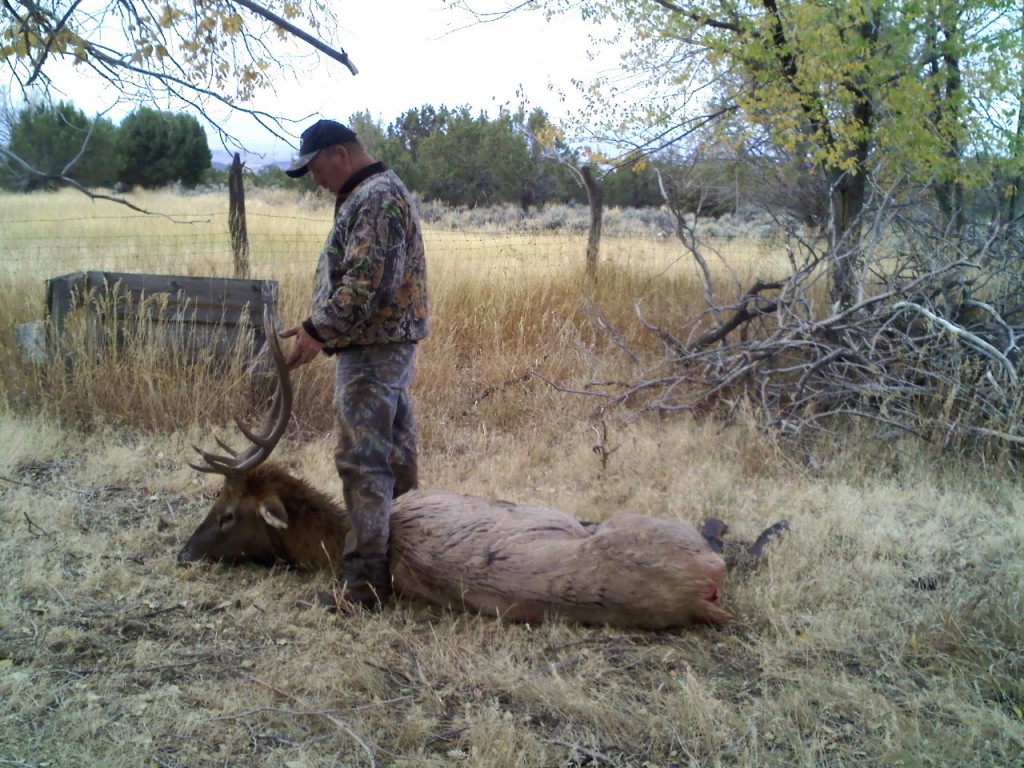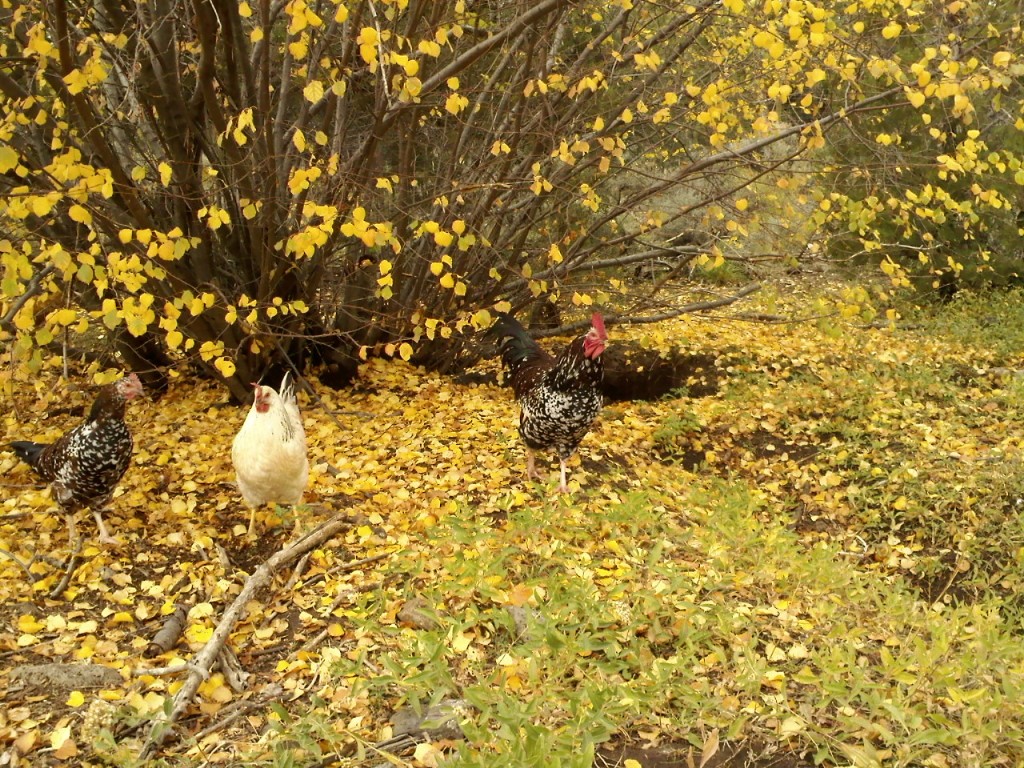 I don’t like guns. I’m almost universally opposed to killing things. So why then, did I spend a recent weekend learning how to handle a shotgun and rifle? What possessed me to take the hunter safety exam necessary for obtaining a hunting license?
I don’t like guns. I’m almost universally opposed to killing things. So why then, did I spend a recent weekend learning how to handle a shotgun and rifle? What possessed me to take the hunter safety exam necessary for obtaining a hunting license?
It began with a dead elk. I was out walking my dog one October morning when I heard a gun shot. As I circled back toward my house, I came upon my neighbor across the road. Merle was with a friend, and the two of them were standing over an enormous, beautiful bull elk the friend had just shot. The meadow where they stood, the old Threewhit property, belongs to Merle and in late autumn through early spring a large herd of elk often occupy the field at dawn and dusk. Merle’s meadow stands directly across from our house, and I’ve spent countless hours on my front porch watching deer, elk, coyotes and foxes wander through.
My first reaction upon seeing the dead elk was horror, then anger that this man had killed such a beautiful animal. Even so, I was drawn to the scene. I walked over to observe while they gutted the elk. I asked the hunter what he planned to do with the carcass. Take it to the processing facility down the road, he said. This elk would feed his family for a year, he told me with gratitude and not a hint of bravado.
I paused for a moment to digest this information. A thought crossed my mind — this good ole’ boy isn’t a trophy hunter. He’s a locavore. This just might be the most ethical way to eat meat.
I’ve given a great deal of thought to meat eating. For the first 13 years of my adult life, I ate no meat at all. I’ve written elsewhere about why I became a carnivore again. My reasons were my own and I will never try to talk a vegetarian into eating meat. I don’t think meat is necessary for survival, and I agree with those who say the world would be a better place if we all ate less meat.
 At the same time, I’ve come to believe that meat can have a place in a sustainable diet. I raise heritage poultry, and these animals are essential to the fertility of our soil. Our small farm is no monoculture; it sustains us with its diverse ecosystem. Compost from the chicken house fertilizes our fruit trees and garden. Guinea fowl and turkeys eat the grasshoppers and bugs that would otherwise overrun our salad greens, raspberry bushes and fruit trees. Geese keep the grass down in the orchard and vineyard.
At the same time, I’ve come to believe that meat can have a place in a sustainable diet. I raise heritage poultry, and these animals are essential to the fertility of our soil. Our small farm is no monoculture; it sustains us with its diverse ecosystem. Compost from the chicken house fertilizes our fruit trees and garden. Guinea fowl and turkeys eat the grasshoppers and bugs that would otherwise overrun our salad greens, raspberry bushes and fruit trees. Geese keep the grass down in the orchard and vineyard.
I’ve butchered enough poultry with my own two hands to know that killing is stressful, sad and difficult work. It pains me every time, but I believe in taking responsibility for my food. If I’m going to eat meat, I must be willing to kill it. The act of taking the life that feeds you instills a gratitude and a reverence for the animal — something that’s missing from the slabs of meat sitting shrink-wrapped in the grocery store cooler.
Which brings me back to the elk. The truth is, I’ve grown to love red meat. I feel better when I eat a little bit of it from time to time, but I am careful about its origins. I want to know that the animals I eat were treated humanely and raised without shots of hormones or energy-intensive feed supplements. I’ve bought sides of beef from neighbors who raise their cows on grass and shares of pork from friends who keep pigs in their cider orchard.
Hunting a deer or elk from my local community seems like the logical next step. It feels more responsible and ecologically sound to eat an animal that was raised wild and natural in my local habitat than to eat a cow that was fattened up on grain or even hay, which is inevitably harvested with fuel-hungry machines. Tight regulation and management by wildlife officials ensure that hunting doesn’t deplete wildlife populations, and a 10 percent tax on ammunition and firearms, mandated by the Pittman-Robertson Act, funds habitat restoration projects across the U.S.
So I’ve decided to try my hand at hunting. I’m in the early stages of what will likely be a long and arduous process. I’ve earned my hunter safety card and made plans to accompany a hunting guide friend on some of his outings this fall. In the coming months, I’ll purchase on my weapon (either a bow or a rifle) and work on my aim so that I’m ready for next season. I won’t take a shot until I’m confident I can hit my target.
It’s possible I won’t be able to go through with it. Maybe I will find myself unable to take that shot or release the arrow. But already I find myself more reverent toward these creatures of my habitat.
***
Photos by Christie Aschwanden.
The elk in Merle’s meadow.
Chickens on our farm.
I took a hunting class and got my small game license in college. I loved skeet shooting, but I couldn’t bring myself to do the final exam, participate in a pheasant hunt. I’m not sure I could have pulled the trigger. I do recognize that if I’m going to eat meat, I should probably be able to kill animals.
I used to be vehemently opposed to hunting for some of the reasons you outline above. But, where I’m from, we have altered the landscape so dramatically and driven up deer populations to such abnormally high levels that hunting has become, in some ways, a humane act. It’s also an act of conservation. Hungry deer can wreak havoc on native plant populations. Sadly, nothing is as simple as I thought it was when I was 14.
I have a great uncle who trophy hunts. He has pictures of himself with dead lions and a whole room dedicated to mounted heads. I think he even shot an elephant. This makes me physically ill, but he points out that he and his buddies pay top dollar for the right to shoot those animals. If that money were funneled into conserving the animal’s habitat, wouldn’t trophy hunting be a good thing? I have a hard time accepting that that’s true, but maybe it is.
I am reading this while watching a deer in my side yard escaping from the rain under the cover of some heavy honeysuckle. I would go out and chase it away, but it is periodically eating the honeysuckle and euonymus I am trying to get rid of. Here, very close to the downtown of a large city, deer are a real pest and a danger as they have no respect for moving vehicles. There have been recent reports of coyotes. A friend told of coyotes attacking a deer near her property which adjoins a large golf course. I am all in favor of shooting deer to feed the hungry, but in this metropolitan area, don’t think it’s feasible. Even my neighborhood policeman says he can’t shoot deer.
I am also very anti-guns.
This was one of the first life-lessons I was able to teach my son, when he was 5; we went fishing together (which he enjoyed), and then brought back a rainbow trout I caught, which I subsequently gutted and cooked up (which he was originally disturbed by) and ate together. In the process he accepted the fact that we take lives to sustain ourselves, and was able to enjoy the meal.
I’ve never hunted before, but if I end up living in the right environment, I might take it up as well.
A lovely post, Christie. Virtually every word resonates with my experience.
I was a vegetarian for 20 years – even taught cooking classes. I gave it up after I developed allergies to virtually every source of vegetable protein under the sun. However, I’m going to stay a hypocrite and let others do my killing for me. If I had to kill to eat meat, I wouldn’t do it. I wear rubber gloves when I make a hamburger patty or stuff a turkey! Just please, don’t make anything suffer in the process – it will haunt you.
“I care about the animals. I want them to be treated humanely. I don’t want them caged and injected with hormones and antibiotics just so I could have a meal. I want them to be free and live a good life. So I can feel better about killing them.”
I don’t get the people who believe mistreating animals in order to produce more food more cheaply is a bad thing, but killing an animal is a positive thing?
Rational and well presented.
Hi Christie,
Nice post. My hat’s off to you for your courage. I hope it all works out well for you. Hunting can be hard work, but so wholly gratifying, as I suspect you’ll discover.
But, as you said,
“…killing is stressful, sad and difficult work.”
It certainly is. I’ve hunted for years and it’s still that way for me. Like with most everything, you get desensitized somewhat over time -at least it’s less of a shock -but for me the gravity, and the sadness for the loss of beauty in my forest, remains.
Killing something the size of an elk or deer, remotely, as with a bullet or arrow, is .. to be straight up -violent.
As Michael Pollan puts it:
“If I’ve learned anything about hunting and eating meat, it’s that it’s even messier than the moralist thinks.”
Sounds like you have some good mentors. But when I sat in on my son’s hunter safety class this past summer, I saw that virtually nothing was done to prepare would-be hunters for the actual act of killing -what to expect and how to act.
If I may make a suggestion and spare you possible grief… If you get your good shot and make good on it, don’t take your gun off your animal until you are sure it won’t get back up. Do not approach until you are certain. Take that time to also collect yourself. The potential problem is that adrenaline charged deer legs can cover a surprising amount of ground, and turn a relatively quick death into a more prolonged one. I rest the horizontal crosshair over the animal’s shoulder and wait. If, however, it was not a well placed shot you may have to improvise to get a second shot.
With the bow, do not approach, or move. Don’t celebrate. Stay hyper-aware and follow it with your ears and eyes to track its exact direction. Having the animal remain unaware of your whereabouts will save you the possibility of something uglier than it might be otherwise.
Apologies for the graphic nature of my post, but a “clean kill” requires forethought.